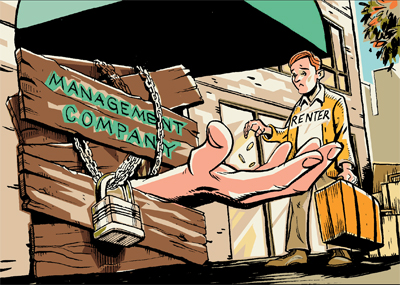
The last three years may have brought Manhattan apartment prices down, but actually moving in New York City is getting more and more expensive.
Faced with skyrocketing operating costs, but also under pressure to keep monthly owners’ charges low — and reserve funds high — condo and co-op boards are feeling the pinch. That means zeroing in on easy revenue-boosters, many of which are charges imposed on new buyers and renters.
Often totaling several thousands of dollars, these costs come in the form of application review fees, administrative fees, move-in fees and various other add-ons from managing agents and boards. These fees, which have been on the rise in many co-ops and condos since the downturn, are usually just an annoyance for buyers, but for potential renters, they can be a deal-breaker.
Rising fees can have a “chilling effect” on rentals and sublets in certain buildings, said Steve Wagner, a partner at law firm Wagner Davis specializing in co-op and condo law.
“If the rents are the same, and the apartments are both equivalent, and one has lots of fees and one doesn’t, which one are you going to rent?” Wagner said.
Patricia Levan, principal of Levan Real Estate, said that in 2007, her rental clients at Midtown’s Orion condo paid nonrefundable processing fees of $550, plus $1,000 in additional refundable fees, in order to move in. Those nonrefundable fees have since increased to $1,720, with $2,000 in additional refundable fees, she said, causing many prospective tenants to back out.
Penmark Management, which oversees operations at the Orion, did not respond to a request for comment.
Real estate attorneys say the ballooning fee structure has to do with both managing agents and the boards themselves. In recent years, boards have encountered mounting financial pressures: Water and sewer taxes are going up, as are oil and heating bills; what’s more, in co-ops, flip-tax revenue has declined thanks to fewer sales in the weak economy.
In the face of these pressures, many boards see managing agent fees as a bloated line item, primed for cost-cutting.
Forced to keep their base fees to a minimum (or risk losing their building contracts), managing agents have, in turn, upped the processing fees they charge to renters and buyers — and in some cases, have tacked on additional ones.
Processing fees have always ranged widely, with some managing agents charging as low as $400, and others as much as $1,200 per application, according to sources in the industry. Still, Aaron Shmulewitz, a partner at Belkin Burden Wenig & Goldman who represents hundreds of condo and co-op boards throughout the city, estimates that the average fee has increased from around $600 when the downturn hit to close to $800 today.
Meanwhile, minor jobs that managing agents used to include as a courtesy — from filing 1098 tax forms with the IRS to checking for window guards in apartments with small children — may now be billed as extras to residents, said Wagner.
Of course, not all managing agents have raised their fees.
“I’m aware of some firms that have increased their fees,” Alex Kalajian, COO of Manhattan-based property management firm Solstice Residential Group, said. “We have not.”
But boards, too, have been simultaneously seeking ways to raise cash, increasingly charging fees of their own.
“Move-in fees, move-out fees, administrative fees, processing fees, call-it-what-you-will fees, but they’re fees,” Shmulewitz said. “It’s sort of like what banks did when interest rates started to fall for financing transactions. They started imposing all sorts of different fees, in different names, on borrowers.”
According to Shmulewitz, a move-in or move-out fee can be as high as $1,000 and is little more than a “revenue-raising device” for the board — unlike refundable deposits, which are used to cover any building damage caused by the move.
Bruce Cholst, a partner at Rosen Livingston & Cholst, said co-op boards are also considering increasing flip taxes — a transfer fee paid by sellers — as a way to raise revenue, while condo boards are now showing a renewed interest in imposing flip taxes for the first time. (Technically, condos can’t impose flip taxes, but some do charge something similar. Cholst says he calls these fees, which go to the building’s reserve fund, the “‘Welcome, Stranger’ tax,” and that they’re becoming more and more common thanks to the downturn.)
Even a couple thousand dollars worth of additional fees probably isn’t going to derail a sale, but rising fees can certainly cause renters and subletters to reconsider.
Donna Olshan, president of Olshan Realty, said she recently placed a client in the Biltmore rental tower in Times Square after discovering that the application fee for renting in the Upper East Side’s Continental Towers condo was upwards of $2,000 — not to mention that the application was also going to take at least a month to process.
Because inflated up-front fees shrink the pool of potential tenants, apartments in condos and co-ops are taking longer to rent than in the past, Levan said, adding that studios are getting hit particularly hard because their occupants tend to have less disposable income.
“This phenomenon puts a further rift between occupying owners and investor-owners, by making renting more difficult,” Levan said.
In some cases, though, that’s the intention — or at least a welcome side effect.
“I’m starting to see condominium [boards] coming to me and asking how they can increase fees to diminish the likelihood that somebody will use the apartment like a hotel,” Wagner said. “There are apartments where there seems to be a turnover every several weeks in Midtown , and they don’t want that anymore.”